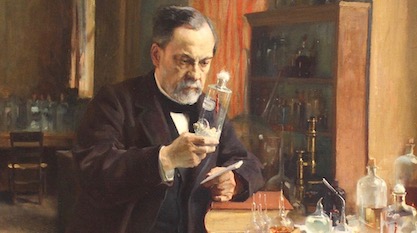 Evolution
Evolution
 Medicine
Medicine
Irreconcilable Differences: Can Darwinism Be Pasteurized?


Michael Egnor has criticized so-called “Darwinian medicine” as a useless concept, since medical science has had spectacular success without it. Darwinism is about the death of the unfit, focused on populations instead of individuals. Medicine is about healing individuals and anyone who needs help, including the unfit, the weak, and the vulnerable. How can the father of evolutionary theory, Charles Darwin, and the father of biogenesis, pasteurization and vaccines, Louis Pasteur, be reconciled?
In PLOS Biology, Samuel Alizon and Pierre-Olivier Méthot try to do just that. Their paper is titled, “Reconciling Pasteur and Darwin to control infectious diseases.” It’s a noble aim to control diseases, but can their conciliatory approach work?
The continual emergence of new pathogens and the increased spread of antibiotic resistance in bacterial populations remind us that microbes are living entities that evolve at rates that impact public health interventions. Following the historical thread of the works of Pasteur and Darwin shows how reconciling clinical microbiology, ecology, and evolution can be instrumental to understanding pathology, developing new therapies, and prolonging the efficiency of existing ones. [Emphasis added.]
The authors point out that Darwin and Pasteur probably never communicated. “Pasteur and Darwin both attended the International Medical Congress in London in 1881 but did not exchange words,” they say. It’s doubtful that Pasteur’s words to Darwin would have been friendly. According to his grandson, Pasteur’s worldview had more in common with intelligent design than with Darwinian naturalism:
Something deep in our soul tells us that the universe is more than an arrangement of certain compounds in a mechanical equilibrium, arisen from the chaos of elements by a gradual action of Nature’s forces. (Pasteur Vallery-Radot, Louis Pasteur, p. 157-158).
Pasteur was also a deeply religious man, and adamantly anti-materialistic. He said:
Posterity will one day laugh at the foolishness of modern materialistic philosophers. The more I study nature, the more I stand amazed at the work of the Creator. I pray while I am engaged at my work in the laboratory. (The Literary Digest, 18 October 1902, via Wikiquote).
It’s not hard to guess which “modern materialistic philosophers” Pasteur had in mind. Alizon and Méthot know that the two men came from strongly different philosophical perspectives.
The life and contributions of these two scientists may seem radically different at first (Fig 1): while Charles Darwin worked mostly alone (despite a large network of correspondents), gathered field data to support his theories, wrote books, and did relatively few experiments, Louis Pasteur led an ‘army’ of research assistants who performed a wide array of experiments, wrote research articles, and typically addressed applied problems of industrial or public health interest. In addition to having different research methods, they had contrasting religious outlooks; Pasteur was known for his devout personality, while Darwin described himself as ‘agnostic’ late in his life. However, both researchers shared the singular ability of being able to make sense of seemingly independent observations. Both also had a profound impact on medicine during their life, without being themselves medical doctors.
“Both also had a profound impact on medicine,” eh? Yes, we see that with Pasteur, whose vaccines and discoveries in microbiology have saved countless millions of lives. For Darwin, the story is quite different, as John West has recounted in Darwin Day in America, particularly in Chapters 13-15. And if Darwin’s motivations for Nazi ideology, eugenics and totalitarian dictatorships are included, we could call Darwin’s approach the medicine of death, and Pasteur’s the medicine of life.
It looks like a hard sell to unite these men from polar opposite ends of worldview spectrum. Let’s see if Alizon and Méthot can pull it off. They readily acknowledge their challenge:
Evolutionary biology currently has a marginal place within medicine. There is even a significant tendency to avoid the ‘e-word’ in the biomedical literature when referring to antimicrobial resistance. Yet in the 19th century, medical sciences were as enthusiastic for Darwin’s ideas as they were initially hostile to Pasteur’s. This support, often implicit, progressively came to a halt in the 20th century for at least two reasons. First, the intellectual proximity between evolution, eugenics, and medicine, most clearly articulated in Karl Pearson’s 1912 address (‘Darwinism, medical progress, and eugenics’) and in George Draper’s constitutional medicine, made scientists wary of implementing evolutionary approaches in medicine, particularly after World War II. Experimentation on human subjects in Nazi Germany revulsed public opinion worldwide and ended eugenic policies, at least in the public discourse.
Scary last phrase there: “at least in the public discourse.” What’s happening behind closed doors at scientific institutions? Some evolutionists are very open about their eugenic views, as Michael Egnor has shown.
The second reason for lack of interest in Darwinian medicine, the authors say, is that “evolutionary biology was still largely viewed as an observational science and no longer had a place within the new configuration of medical knowledge and training organized around specialities [sic] and characterized by experimentation.” That tells us something important about Darwinism; it’s less in the scientific business of experimentation as it is in the art of weaving narratives in order to fit observations into Darwin’s picture of the world.
Having acknowledged the challenge before them, Alizon and Méthot make a plea for integrating evolution into medical training. The way they define evolution, though, makes their particular advice uncontroversial:
There is now increasing support for the teaching of evolutionary biology in medical faculties. When teaching medical students, however, one should call attention to the set of assumptions often made regarding ancestral lifestyles or the adaptative [sic] value of certain traits or behaviours. Furthermore, it should be emphasized that medicine and evolution have different ‘conceptual bases’ and are typically concerned with different problems: whereas the former focuses on restoring health at the individual level, the latter studies biological variations at the population level and how they change over time.
If that is all they are talking about, nobody will make a fuss. Even the most ardent creationists acknowledge “biological variations at the population level and how they change over time.” The question then becomes, what has Darwin got to do with this plea? Variation has been observed for millennia. What made Darwinism so controversial was his claim that the entire biosphere emerged from one primitive cell by blind, unguided processes. To argue that, he had to make natural selection a creative force, able to create wings and eyes where none existed before.
In the bulk of their essay, Alizon and Méthot talk about antibacterial resistance (see Jonathan Wells, Zombie Science, Chapter 8, for discussion of what that has to do with Darwinism). They suggest medical practices that are best suited to effectively control outbreaks of resistant strains. Darwinism seems only marginally involved here, supported by occasional references to “evolutionary arms race” situations and “co-evolution.” The authors illustrate it with examples, such as when a doctor’s ‘hit hard and hit fast’ strategy with antibiotics actually creates conditions for virulent mutants to multiply. Nothing about this need involve Darwin, however. It’s population dynamics, not creation of novelty.
They mention “the emergence of new infections,” saying “Emergence often involves adaptation to new hosts,” but that doesn’t involve the origin of species or the creation of novel complex designs. As Michael Behe cogently pointed out in The Edge of Evolution, mutants become resistant by breaking things. A bacterium might break its interface with a drug, for instance, achieving resistance but not creating anything new. In a recent ID the Future episode, Ann Gauger described this kind of “evolution” as “throwing the deck chairs off to make the boat go faster.”
The interplay between parasite and host has more to do with ecology than evolution. Alizon and Méthot repeatedly conflate the two, making it sound as if dynamic interplays of variants in parasites and hosts are always Darwinian in nature. Not necessarily; if no new information is added, and if no truly innovative complex structure is created, then neither organism makes the kind of upward progress Darwin envisioned. It’s a demolition derby. The ship that throws off the most cargo and remains the afloat would win. That kind of ‘evolution’ is not what Darwin had in mind. One of the illustrations in Alizon and Méthot’s paper shows resistant strains already present in the host, given the opportunity to proliferate when antibiotics kill off most of the non-resistant cells.
Typically, resistant strains lose ability to compete in the wild, only succeeding in artificial environments like hospitals. The authors even point this out:
Based on datasets from the United States and Ireland, it has also been argued that larger hospital sizes favour the spread of antibiotic resistance, one interpretation being that a network of small hospitals maximises the risk of stochastic extinctions of newly emerged resistant variants.
Those “stochastic extinctions” occur because the newly emerged resistant variants cannot compete in more realistic environments, where wild-type strains have not had to throw their cargo and deck chairs overboard. Understanding such ecological factors leads some hospitals to release patients earlier to their homes, so that the reservoirs of resistant strains have to compete with stronger (and less virulent) strains in the natural environment. Some hospitals are providing environments like gardens where patients can be exposed to less hygienic, natural conditions. These settings encourage recovery not only by driving resistant strains extinct faster, but by providing patients with opportunities for mental well-being that natural beauty engenders.
Additionally, evidence is growing that bacteria can obtain resistance genes through horizontal gene transfer, such as from soil bacteria. If so, there’s nothing Darwinian about this, either. The sharing of pre-existing information indicates design, not evolution.
In conclusion, there is an urgent need to switch from an eradication to a control perspective as already advocated in 1955 by René Dubos or in 2000 by Joshua Lederberg. We should add to the search for ‘magic bullets’ the development of strategies to manage and mitigate pathogen evolution. In that sense, interventions that have a strong ecological and evolutionary dimension, such as microbiota transplantation, new ways of administrating drugs (varying doses, alternating or combining molecules), or even advances in phage therapy, could be the future of public health.
All the proposed benefits of “ecological perspectives” in medicine can be achieved without Darwinism. It’s hard to understand why some Darwinists are so intent on importing Darwinism into a field that doesn’t need it and has suffered from it.
On what basis can Alizon and Méthot plead that their advice would be good for suffering humans? What’s Darwin got to do with help for the weak? Humans, in Darwin’s view, arrived by accident, have no exceptional value, and will go extinct in time. The Darwinian view of humanity is amoral and heartless. If the bacteria win over the human, it just shows who won the evolutionary arms race and demonstrated survival of the fittest. If you see a Darwinian doctor at your bedside, pull the alarm, because you won’t be able to tell if he is rooting for you or for the germs.
The best way to Pasteurize medicine is to raise the heat till the harmful Darwinian ideas, like eugenics and survival of the fittest, die off. The result will be a vibrant medical enterprise promoting human health and well-being with pure motives.

